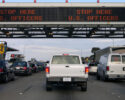Podcasts
Dr. Stephen Coggeshall, Chief Analytics Officer with “Life Lock”, joins Les Sinclair to talk about the Anthem data breach. The hackers got information including names, birthdays, medical IDs, Social Security numbers, street addresses, e-mail addresses and employment information, including income data.
FTC Consumer Sentinel report: http://www.ftc.gov/system/files/documents/reports/consumer-sentinel-network-data-book-january-december-2013/sentinel-cy2013.pdf
Virginia ranks 16th out of the 50 states for identity theft complaints – see Page 15.
SIMPLE TIPS TO MAKE AN IDENTITY SAFER:
1. When your personal information has been compromised, you may be at risk of identity fraud for years.
· In this digital age, where data breaches are more commonplace, you can help take ownership over your identity by using an identity protection service.
· LifeLock provides identity protection services. With LifeLock Advantage™ and LifeLock Ultimate Plus™, you can set alerts on your accounts to flag certain cash withdrawals, balance transfers and large purchases for those accounts which are in the LifeLock network.
2. Starting now, watch your transactions carefully, looking for any charges that don’t seem to be yours.
3. Report suspicious transactions immediately. If you see a card transaction that doesn’t look right, contact the card issuer immediately. The phone number is on the back of your card.
4. Over the next few months, continue to look for unusual activity on your card. Continue to watch this developing story. Millions could have been affected. That’s why it’s important to keep watching your transactions—not just today or tomorrow, but ongoing.
5. With Tax Season approaching be sure to file your taxes early to avoid an issue, as tax fraud can be committed with only two pieces of information – a Social Security Number and a date-of-birth, not even a name.
More background on the breach:
Yesterday, Anthem Inc. – the nation’s second largest health insurer – confirmed the first major breach of 2015 with the personal information of what could end up being tens of millions of Americans being compromised. The information accessed included names, birthdays, Social Security numbers, street addresses, email addresses and employment information, such as income data. As breaches continue to happen it is important for potential victims to focus on what can be controlled and take ownership of their identity and doing what you can to help protect it. Once a Social Security Number is stolen it can be used for years down the road and the repercussions may not be immediately seen. Social Security theft can lead to all types of identity theft including medical, tax, employment, investment, etc.









